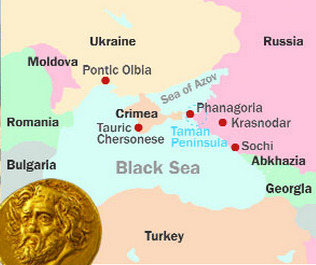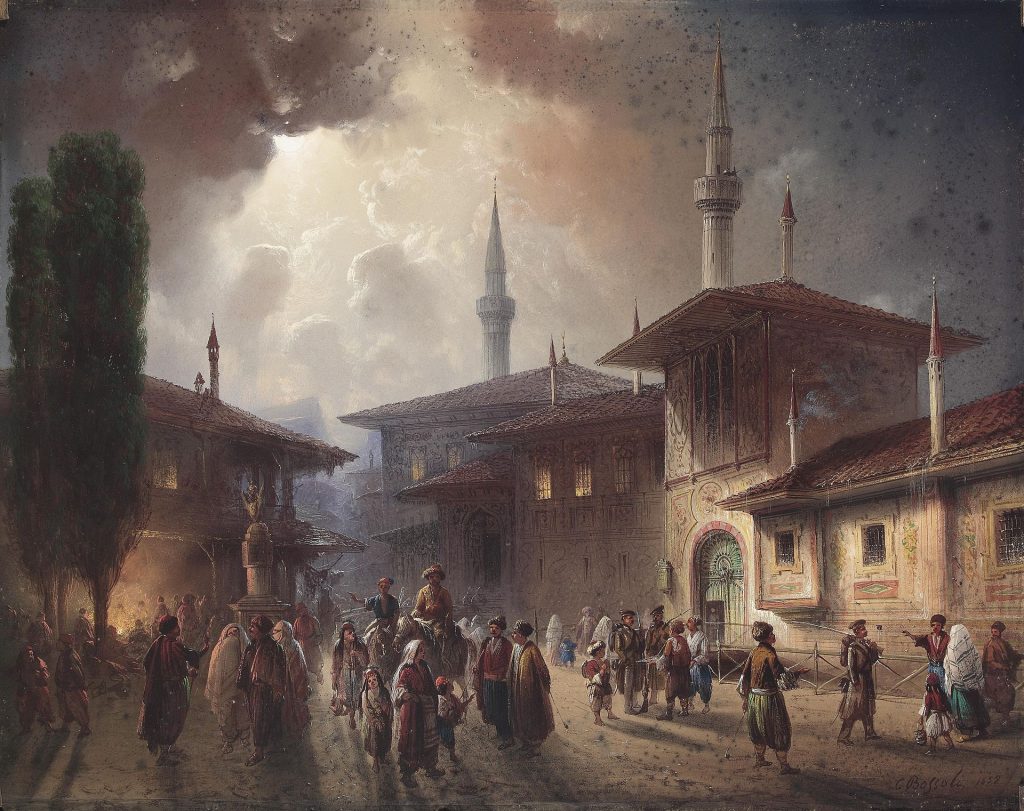“Grabrich” recently reminded me of an excellent study on the background to the Ukraine crisis today. I quote one section from early in the book setting out an overview of the historical background to Russia’s involvement in Crimea. I have added hyperlinks and broken up the paragraph for easier reading.

The Crimean peninsula is the heartland of Russian nationhood. It was here in Khersones that Prince Vladimir adopted Orthodoxy as the official religion of the people of Rus.
Following the Mongol invasion, the Crimean Khanate ruled the peninsula from 1441, whose territories at one point encompassed a large part of the northern Black Sea littoral.
From 1736 Russia started its push to take over the region, prompted in particular by the desire to put an end to the raids on the Slavic parts to the north.
Catherine the Great’s push against the Ottoman Empire saw Crimea occupied by Russian forces in 1783, and on 2 February 1784 it formally entered the Russian Empire as Taurida Oblast.
In turn, the Tatar population now faced successive waves of deportation, including in response to the threat from Napoleon in 1812, when they were sent to Siberia, and then in 1855, towards the end of the Crimean War, when they were branded as enemy agents and tens of thousands were sent to Turkey.
From the 1860s the imperial authorities launched a new wave of deportations, accompanied by attempts to Russify the northern Black Sea region.
The worst deportation was Stalin’s, on 18–20 May 1944. The whole population, some 230,000, including 40,000 who had served with distinction in the Red Army, were sent to Siberia and Central Asia, with at least 100,000 expiring en route of hunger and thirst. They had been accused of collaboration with the Nazi occupiers, but given the purges of the 1930s, which had wiped out much of the Crimean Tatar elite, surprisingly few (some 2,000) joined ‘defence teams’ rather than be sent to work in Germany.
Tatars now make up 13 per cent of the Crimean population, whereas before the Russian occupation of 1783 they comprised 80 per cent.
In 1954 the region was transferred from Russian to Ukrainian jurisdiction, a decision that was contested from the first, above all because Russians made up the majority of the population.
The 2001 census revealed that 1.45 million (57 per cent) out of a total population of 2 million claimed to be Russians, 576,000 Ukrainians and 245,000 Tatars, while some 77 per cent were registered as native Russian-speakers.
It was the return of Crimea to Russia in March 2014 that transformed the Ukrainian crisis into a major European confrontation (see Chapter 5).
Sakwa, Richard. 2015. Frontline Ukraine Crisis in the Borderlands. London ; New York: I.B. Tauris, 2015. pp. 12f
If you enjoyed this post, please consider donating to Vridar. Thanks!


Crimean Tatar Wikipedia: “Crimean history” per Google Translate From: Azerbaijani To: English
I’m OK with Crimea rejecting the neo-Nazi regime that has overthrown Ukraine’s democracy.
Just as we were not prepared to go to war for the Czechs, I don’t see the U.S. going to war for Crimea and the Donbass. Given that reality it would be better for the Ukraine to bight the bullet and accept a diplomatic settlement of border adjustment and population exchange. In a stand up, knock down, drag out with Russia they can only lose badly.
It is lose – lose situation for Ukraine. If they would do as you say, who would guarantee that Russia won’t continue aggression on other fronts? Kiev is more important in Russian history than Crimea. Some politicians from Moscow already suggested that Lviv should go to Poland, and Kiev to Russia. In times when “you can buy red army uniforms in every shop” partition of unstable and weak country is easy thing to do. But that whole situation shows that Russia in many ways already lost Ukrainian cause. Ukrainians, especially young ones do not want to be part of any kind of “slavic world”, simply because it has almost nothing to offer for human well-being, but a lot in matters of corruption, abuse and alcoholism. You can be proud slav whit Dostoyevsky books on your shelf and enjoy your human rights as proud European.
They’d be rid of their fifth column and Moscow deprived of excuses and fig leaves. Having lots of people who would rather be in another country, especially when that other country is a revanchist Great Power isn’t a good idea. Russia would be signatory and victor and acknowledged as a Great Power; if they aggressed again, well the likelihood is European defence spending would have doubled and the response would, this time, echo that of the Entente in 1939. Also at some point the Chinese are going to want the Amur Basin and the Treaty of Nerchinsk frontier back; I doubt Moscow would want to give them the opportunity of getting that in a just war to put down a ‘rogue state’, I assume the Russians are rational actors and we would know which side our bread is buttered on. Siberia is about to defrost, Russia needs another Great War like it needs a hole in the head: they know the odds are we’d win and Mother Russia would finish rather truncated and bereft of that Siberian opportunity.
Another thing that is more than likely in the event of Kiev coming to their senses is the Ukraine joining NATO and the EU. I think it would be sensible to offer that in return for accepting border adjustments and population exchanges; but we are probably destined for a lot more pointless bloodletting before sanity and realpolitik prevails.
I wonder if in next few years I’ll find on this blog similar explanation on conflict with Estonia or other small neighbor of Russia. Many people in my part of our planet is worrying about this. It is so many things to consider – Russia is today relatively weak, Russians are enjoying (even considering what kind of monster Putin is) more freedom than ever before, also their life is better and more connected with other countries than in the past. Still, as social and political construct, forged by imperial ideology, Russia is dangerous. To say that some in the West are demonizing her for some political reasons is to say only half of the truth. The other half is that the West prefer to think about Russia as the East of Europe, simply because there is so many nations there that almost no one know, like mentioned Estonia. Russia, in her advantage, has great culture, is recognizable, even in visual sphere, is popular and looks beautiful, especially from far away. But it is hard to live decent life under kremlin rule. That is why Poland is nowadays West-oriented. That is not primarily matter of nationality or history – it is matter of civilization, law, human rights, free elections, etc. Before 1989 Poland was more nationalistic country that it is now, we had greater army, etc. but life was miserable. That is the same reason why people of Ukraine lately riot against Russian influence. Maybe most depressing is fact that rule of violence as opposite to the rule of law is sad part of our patrimony. That is why many people here hails Putin as “tough guy”, because it is so much simple to have tyran with a drop of humanity that democratic society with boring politicians.
If Sakwa has distorted or misrepresented the history outline then do advise where it needs correction. (I did not think the above outline paints Russia in a “good” light by any means. Russia was in breach of international law in retaking the Crimea. The point is to try to understand the background to a perspective that is not generally known in the West and to provide some factual basis that does not come across in propaganda. Even the West has its own propaganda tales to justify its own expansionism.)